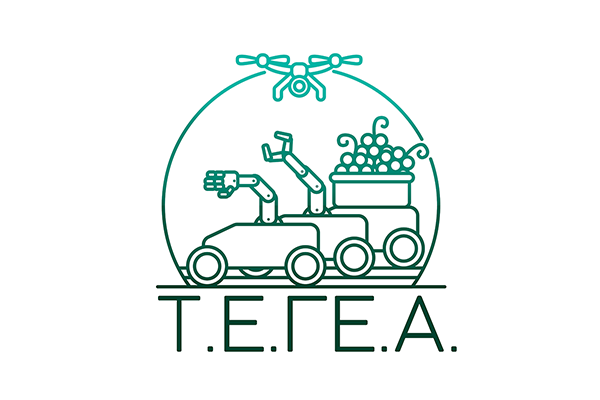
- BRIEF DESCRIPTION OF THE PHYSICAL OBJECT OF THE PROJECT
Precision farming practices, which include the application of individualized practices on the basis of local measurements on land parcels, are not suitable for all agricultural operations. In particular, the production of selected high quality agricultural products additionally requires manual skills based on empirical knowledge. For example, viticultural works such as harvesting, various pruning practices, spraying, etc. require the aforementioned skills. This high value-added project proposes the development of an integrated (in the sense of integrating many skills) innovative technology called “Skillful Viniculture Technology (SVTECH)” for optimal collaboration of a team of wheeled robots equipped with sensors and electronic instruments to which appropriate manipulators are mounted. The (ground) team of robots will be provided with navigation maps from an aerial drone. The aim is the mass automation of selected viticultural works with the long-term goal of minimizing the human presence in the vineyard during the production process. In other words, the long-term goal is to extend the fourth industrial revolution (Industrie 4.0) to agricultural production. Incentives for automation of skilled work to produce quality grapes and, consequently, consistently high quality wine include: increasing profit margins in winemaking, lack of experienced workers during seasonal demand, drastic reduction of natural pollution, e.g. from pesticides during spraying, while reducing the cost of spraying, and increasing production through automation. A long-term incentive is the opening of innovative industrial production for the development, improvement, maintenance and operation of SVTECH technology in the Region of Eastern Macedonia and Thrace. The basic logistics infrastructure includes a drone and three appropriately equipped, wheeled robots. The drone is used for mapping, the two wheeled robots are “skillful”, while the third is a “carrier”. In particular, each skilled robot has a robotic arm equipped with at least one robotic hand mounted on it, as well as various electronic sensory instruments, including cameras. A skilful robot performs viticultural work either alone or interacting collaboratively with another skilful robot. Finally, a skilled robot can steer the carrier robot when it comes to transporting materials. As part of this pilot project we will focus on the following basic viticultural tasks: (1) mowing (see leafing, pruning and harvesting), (2) spraying (preventive), (3) tying, and (4) decision making (for timely detection of specific diseases, for example see botrytis and downy mildew, as well as for production forecast). This proposal proposes multiple extensions / innovations in the current project T1EDK-00300 (EPANEK) entitled ” Personalized Optimal Grape Harvest by Autonomous Robot (POGHAR)” of the INNOVATE Action (budget almost 1 million). The proposed extensions / innovations concern, firstly, the range of skillful tasks performed by wheeled robots in viticulture, secondly, the optimal collaborative engagement of two types of robots operating either with specific skills or as porters, respectively, and, thirdly, the extensive use of mechanical human-like hands.
- IMPLEMENTATION METHODOLOGY
Skilled Viticulture work of interest is classified into the following four main categories: (1) Cutting, including pruning, , leafing, harvesting, and mowing, (2) Spraying, (3) Fastening, with a stapler, and (4) Decision making for timely detection of diseases, for lubrication required for production forecast. Spraying is applied to the vine for diseases either preventively (preferably) or therapeutically. In any case, we are interested in applying the spraying in a targeted way, i.e. where and as needed, thus protecting the environment from the excessive use of pesticides and reducing production costs. We need at least two skilled robots because some viticultural work (1) requires two-handed cooperative skills, e.g. “binding”, and (2) is accelerated by teamwork, e.g. the vintage. Mechanical hands will mainly be used for harvesting. Meanwhile, the usual viticultural tools used by humans for all other viticultural work will be used, appropriately mounted on a robotic arm. Alternatively, mechanical hands will be used to handle the aforementioned tools in the same way as the human hand. Different types of commercial mechanical hands will be tested comparatively. Although commercially available mechanical tools are currently expensive, their ability to handle a variety of (cheap) tools mitigates their overall cost of use. In addition, mechanical hands are suitable for working with people. The project implementation process will initially include the design and development of the necessary software regarding the above agricultural work in which the robotic systems will participate. As part of the design, the necessary research procedures will be completed to capture the best practices required in agricultural work in order to select the methodology to be applied to the project. At the same time, the robot navigation applications will be developed, including the inter-robot communication, especially during their cooperation for the execution of group tasks, as well as the determination of the data that will be extracted and processed by the sensors. Then, following the completion of the individual stages of the aforementioned works, the equipment will be procured and the construction of all the devices for the cutting, spraying, tying and transporting of objects will take place. During the implementation of the project, two levels of testing and evaluation of the implemented procedures will be carried out, in order to make the necessary parametrizations that will contribute to the successful completion of the project. The testing and evaluation procedures will be accompanied by relevant reports. Finally, the project will be completed with the gradual display of the individual development results and the tests carried out, as well as the business exploitation of the results, securing them and developing the appropriate business plan for commercial exploitation.